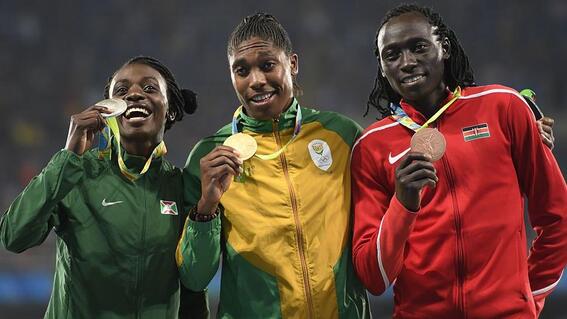Pistorius did not qualify for Beijing 2008, but he did for subsequent able-bodied competitions, including the IAAF's 2011 World Championships (earning a silver medal in the 4x400 meter relay) and the London 2012 Olympics. At London, he became a superstar icon of the sport, noticeably marketed as a draw by broadcasters and media partners. Oscar Pistorius was a welcome example of the inclusive and welcoming spirit of competition that the Olympics and its signature sport, track and field, can showcase.
Cut to this week, where Caster Semenya was dealt another blow in her appeal for World Athletics to allow her to compete. Semenya, who had been competing under World Athletics competition, and a two-time Olympic gold medalist already, was suddenly told in 2018 that she was not eligible anymore in her target event of 800 meters.
At that time, the IAAF classified runners of Difference of Sexual Development (DSD) as ineligible to compete in races from 400 meters to a mile, unless they submitted to a testosterone-reducing regimen. In short, women they deemed as having too much testosterone were - are - banned from those distances.
This immediately targeted Semenya, long subjected to criticisms of her femininity counting back to her London 2012 debut, as well as both of the other Rio 2016 800 meters medalists, Francine Niyonsaba and Margaret Wambui. Most recently, sprinter Aminatou Seyni has been blocked from her best event of 400 meters due to the restrictions. Semenya appealed the IAAF's ruling, first at the CAS and then the Swiss Supreme Court, losing the latter and maybe final case this week.
World Athletics maintains their new rules are based on science and research, and that preventing women with higher-testosterone levels from competing naturally maintains an "even playing field". But when is naturally-inherent sporting skill beholden to an "even playing field"? I don't recall anyone telling swimmer Michael Phelps that his specific and unique natural-born attributes were an unfair advantage.
One striking item about the World Athletics DSD rule is that it only restricts affected athletes from specific events, from the 400 meters to the mile. Why no restrictions from the other events their research showed as possibly compromised by DSD athletes, the pole vault and hammer throw? Put simply, there's no need for those events to have restrictions, as there isn't currently any (presumed) DSD athlete significantly competing in them. So, the rule is really about targeting Semenya, and Niyonsaba and others, and artificially ensuring closer competition.
Not to bash Phelps, but his continued dominance over his rivals has been celebrated time after time. Why should a woman's dominance not be as celebrated as unique?
I hold still to my initial thought when I read of Semenya's latest setback this week. She was born a woman. She was born with higher testosterone than other woman may be. She is still a woman. She should be able to compete as one.
Another troubling aspect is that, so far to the public's eye, the DSD ruling is affecting only African-born women: Semenya (from South Africa), Niyonsaba (Burundi), Wangui (Kenya), Senyi (Niger). Aspects of European-based bureaucrats deciding who is and isn't a "legal" woman has unfortunate shades of colonial racism. Again, some women may be born with higher testosterone. They are still women. Semenya's particular against-the-standardized-grain of femininity is surely a factor as well.
World Athletics had - has - an opportunity for applauding natural diversity of athletes, and in this case, of its women. And, as with its initial restrictions on Oscar Pistorius, the governing body has woefully missed it. Rather than standing for what it perceived to be correct femininity, it would have been far more braver and inclusive to proudly stand for naturally-given talent, no matter how dominating. Remember how celebratory Pistorius' appearance had been?
Wherever Semenya goes next -she has entertained the idea of trying the 200 meters - she remains a champion of the sport, and of womanhood. I'll be cheering.



 RSS Feed
RSS Feed